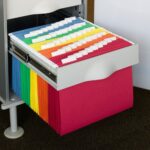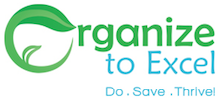10 Tips for When Letting Go is Hard

Life was simple. Hard, but simple. There were no greeting cards, pictures, extra clothes nor shoes. No accumulated memories of a life time. No households of stuff when relatives passed away. There weren’t any books nor piles of paper, no projects – completed or not. There were no electronics nor thousands of accompanying accessories. There was no myriad of sporting paraphernalia. Nothing to declutter.
There was what you needed to survive. That’s it. Maybe you carried a small carving as a token or good luck charm. But mostly what you loved were your family and the experiences you shared. You carried virtually nothing to your grave.
I’m not suggesting that we go back to cave man days. Life is much more comfortable now, and more complicated. We spend a lot more time organizing our stuff – and getting overwhelmed by it.
So what do you do if you’re overwhelmed by your stuff but you really want to declutter? The number one priority is to reduce the amount of stuff you have. So how do we let go?

7 Tips for Paper File Management
Easy access to documents ensures employees can spend their time working on the projects at hand rather than looking for a piece of paper. Estimates of the time that the average employee spends looking for documents range between 2 and 8 hours per week (statistics gathered by the National Association of Professional Organizers) or 100 to 400 hours per year.
We all know time = $, let’s look at the breakdown. According to Gartner Group, Coopers and Lybrabd, Ernst & Young, the average time to retrieve and refile a paper document is 10 minutes. An average of 3% of documents are lost or misfiled, and have to be recovered at a cost of $120 per document. This equates to a cost of $2,160 to $8,640 per year.
An effective paper filing system will reduce the amount of time people have to look for documents and reduce the number of documents that are lost or misfiled, therefore reducing cost. It’s a win-win-win.
Keys to effective paper filing systems:
- Label files clearly
- Have some order to the filing. You may use different types of systems for docent categories of files.
- Alphabetical – useful for client files
- Categorical – can separate different categories such as vendor files, client files, financial files, etc.
- Chronological – useful for financial files
- Frequency of use – can keep documents that are referred to frequently at the front of a file cabinet.
- Priority based – particularly useful for active projects.
- Create rules for where each type of document should be filled.
- Only have one home for each type of document.
- Create naming conventions for files that everyone uses.
- Have a system for quickly identifying where a document or file folder should be returned to if it is removed from the filing system.
- Keep active files separate from files that need archiving.

Create Space in your home

National Green Week
Have you ever wondered when you realized that taking care of the environment is a good idea? Maybe it was on a family camping trip. Maybe it was watching a nature documentary. Maybe it was at school when they taught you about recycling. At some point, taking care of the environment went from your subconscious to your conscious.

Now you may take little conscious action to take care of the environment, or you may take a lot of conscious action. You may only do what you are forced to do, like not bringing home your groceries in plastic bags anymore because your local grocery store has been mandated not to use plastic bags. You be at the other extreme, making every living decision weighted towards the best environmental outcome. But you are probably somewhere in between. And during National Green Week, thousands of school students will learn a little more about taking care of the environment and how to live more sustainably.
National Green Week (link: http://www.greeneducationfoundation.org/greenweek.html) actually runs from Feb 2 through April 25. Schools around the country choose a week within that time frame and choose a project to focus on during the week. Projects fall under one of six themes: green energy, waste reduction, green thumb, I ride green, green building or sustainable water.
So what does this have to do with business? Well, if school kids can take small steps to being more sustainable in their lives, we can find somewhere to be more sustainable in our businesses.
Even though change can be instituted in large, radical giant steps, change can also be effectively implemented in small, continuous changes. Small changes are often easier to incorporate into your daily routine.
This year our big change goal is to purchase a car with an awesome gas mileage, perhaps even an electric car – we are still researching the options.
Our small change goal is to stop collecting business cards, using our smart phone apps on the spot to collect contact information.
We would love to hear your change goals. Drop us an email, or leave a comment on our facebook page.
How can going paperless benefit my business?
Going paperless is a bit of a misnomer. It’s impossible to be completely paperless, even in this digital age. There are some documents that need to be maintained in the original hard copy – certain contracts, certificates and so on. But not withstanding those hard copy “must haves,” a great deal of the paperwork that is dealt with today can go digital. Digitizing sales orders, invoices, reference material, business cards, and business documentation is a smart move.
The summary:
Benefits
- Reduce paper clutter
- Mobile access
- Fast searching
- Low cost storage
Tips
- Choose location – desktop or cloud
- Choose file structure
- Use filename convention
- Use scanner regularly

Paper: Identify the Problem (and solution!)
 Is paper a problem in your life? Does it end up all over the house? Are there piles on your desk? Let’s identify the problem and then look at some solutions.
Is paper a problem in your life? Does it end up all over the house? Are there piles on your desk? Let’s identify the problem and then look at some solutions.
First, the problem. Paper comes into your house or your office. You have other things to attend to right away, so you drop your mail on the nearest horizontal surface on the way to your task. What happens is that over time, piles are distributed everywhere. There is no semblance of order. You don’t know what mail is oldest and which is newest. Time sensitive mail, such as bills, are mixed in with junk mail. There is no method to the madness. You are overwhelmed with the clutter.
Contrast this with the ideal situation. You bring your mail in and deal with it immediately, each day. It doesn’t even reach a surface because it is dealt with immediately. There are no piles, no overwhelming paper clutter. You can access any piece of information within 30 seconds. Your bills and correspondence are up to date.
It is difficult to change our habits overnight, but there are steps we can take to move towards our ideal.


